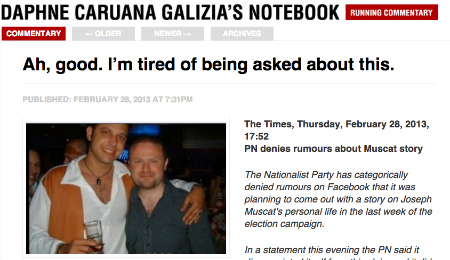What follows is a strange kind of guest post. It comes to J’accuse via a serendipitous trip through time and space. It’s the kind of post that has been just been waiting to surface and I cannot agree more with the argument being made by the guest writer whom I shall call DeLorean. It is an impassioned argument set out against the constitutional provisions that were framed in 1991 to keep the PLPN system working. It’s not pro-ad, it’s pro-democracy, representation and choice. Read it. It’s important – for you and for future generations.
The argument
Many people have been misguided into thinking that the fight over [the electoral laws] has something to do with Alternattiva Demokratika. It does not. It has everything to do with resisting the entrenchment of the two-party system.
During a discussion on broadcasting […], one prominent government minister (that was gratuitous… all ministers are prominent) remarked that he “firmly believed” in the two-party system “because this makes the country more governable”. It was all I could do to fight the urge to throw my handbag at him, and point out that, following his line of argument, the most governable countries of all should be those with one party. But that, as we all know, has failed.
Belief in a two-party state is belief in a form of totalitarianism masquerading as democracy. All we have now is a political see-saw, with a fat Nationalist boy sitting on one end, and a pudgy Socialist boy on the other. First one goes up, then the other. Is this a wonderful state of affairs, to be preserved at all costs? Should governability enter the argument at all? Who cares about governability, if in ensuring governability we strangle the democratic process? Governability is not the Holy Grail, and we should not allow the government to sell it to us as such.
Individual members of both the government and the opposition have expressed their delight in the two-party system. They have not dared express their real longing: for a one-party system. When a party believes that it fulfils all the needs of all the Maltese people – how dare anyone claim to do so, and still they do – the next step is to claim that it should govern ad aeternum. Why not, once it is so damn perfect?
Third parties cannot be created out of nothing. They must grow, and their growth must be spawned by a real need within the people. Even if this need exists – and there is no doubt at all, it does – all growth will be warped by Malta’s all-pervasive fear and ignorance, which has effects similar to that of radiation on a growing foetus. Through this fear and ignorance, the Nationalist Party and the Labour Party survive, thrive and continue to grow.
Meanwhile the Maltese population lives in an atmosphere of political instability. I define political instability as not knowing what life holds for one after each election, of the necessity of mapping one’s life in a series of five-year plans.
Austin Gatt is right: on paper, the [constitutional electoral provisions] favour the small parties. In practice, they mostly do not. It is practice that concerns us here, and not theory. Dr. Gatt is almost certainly unable to stand up and say, with his hand on his heart, that the [constitutional provisions] will not, in practice adversely affect any small party. They will be a death knell. They will also discourage the growth of political parties in the future, which is a cause for grave concern.
Alternattiva is not the crux of the problem. The hypothetical small party is. Many people might disapprove of Alternattiva, but they should not be so shortsighted as to assume that they will disapprove of any other political party that might grow out of unrest and discontent over the next two or three generations. We must be unselfish enough to think beyond the next two or three generations.
We must be honest enough to admit that we do not want our children to live their adult lives as we are now living ours. We must stop thinking in terms of our immediate future, because many of us will live for a great deal longer than that, certainly longer than most of the politicians [who are now readying themselves to vote, using a hammer and chisel, on amendments to our Constitution].
What if we find ourselves, in 20 years’ time with the choice of two absolutely disreputable political parties? What if the Nationalist Party disintegrates into the kind of sagging, soggy, useless mess of the Sixties… a heap that gave rise to the joke “Tgħajjatx għax tqajjem il-gvern!”? What is a traditionally Nationalist supporter supposed to do… vote for the Labour Party, vote for a mess, or not vote at all?
[… fragments lost]
This article originally appeared in The Sunday Times of Malta on the 3rd November 1991.
(To understand the future, we have to go back in time).

